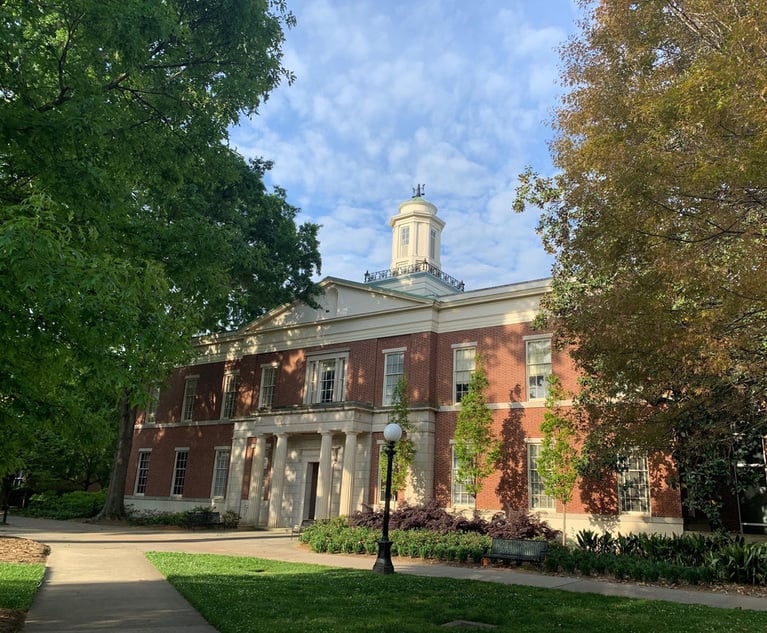PPP Loans and Small Business Debtors In Bankruptcy
At present, there remains no avenue for Chapter 11 debtors to receive PPP Loans during the course of the bankruptcy case. The limitation on PPP availability notwithstanding, other legislative changes have greatly enhanced the eligibility for and efficacy of bankruptcy relief for many small businesses.
May 13, 2021 at 12:06 PM
10 minute read
This article appeared in The Bankruptcy Strategist, featuring the strategies and techniques devised by the country's top bankruptcy lawyers and reports on innovative procedural techniques, legislative developments and recent judicial rulings — plus what they mean for you and your clients.
A number of legislative modifications were made to the Bankruptcy Code to reduce the economic impact of the COVID-19 pandemic on distressed debtors, particularly small business and individual debtors. While a few of these changes expanded protections previously granted to small business debtors pre-pandemic, a major pandemic relief program, the Paycheck Protection Program (PPP) was not made available to debtors in bankruptcy proceedings. After Congress established the PPP in The Coronavirus Aid, Relief, and Economic Security Act (the CARES Act), enacted on March 27, 2020, a number of debtors in pending bankruptcy cases applied for PPP loans. The Small Business Administration (SBA) opposed PPP loans for debtors, and courts were split as to whether the SBA could block debtors from qualifying for and receiving PPP loans. Two circuit courts, the Eleventh and the Fifth Circuits, ultimately ruled against the debtors. USF Federal Credit Union v. Gateway Radiology Consultants, P.A., No. 20-13462 at 43 (11th Cir. 2020) (holding that the SBA did not exceed its authority in adopting the non-bankruptcy rule for PPP eligibility).
This content has been archived. It is available through our partners, LexisNexis® and Bloomberg Law.
To view this content, please continue to their sites.
Not a Lexis Subscriber?
Subscribe Now
Not a Bloomberg Law Subscriber?
Subscribe Now
NOT FOR REPRINT
© 2025 ALM Global, LLC, All Rights Reserved. Request academic re-use from www.copyright.com. All other uses, submit a request to [email protected]. For more information visit Asset & Logo Licensing.
You Might Like
View All
GOP Now Holds FTC Gavel, but Dems Signal They'll Be a Rowdy Minority
6 minute read
'Serious Legal Errors'?: Rival League May Appeal Following Dismissal of Soccer Antitrust Case
6 minute read
28 Firms Supporting Retired Barnes & Thornburg Litigator in Georgia Supreme Court Malpractice Case
7 minute read
How Some Elite Law Firms Are Growing Equity Partner Ranks Faster Than Others
4 minute readLaw Firms Mentioned
Trending Stories
- 1PayPal Faces New Round of Claims; This Time Alleging Its 'Honey' Browser Extension Cheated Consumers
- 2Fired NLRB Member Seeks Reinstatement, Challenges President's Removal Power
- 3NY Inspector General Announces Attorneys Hired to Lead Upstate Region and Gaming
- 4Carol-Lisa Phillips to Rise to Broward Chief Judge as Jack Tuter Weighs Next Move
- 5Data Breaches in UK Legal Sector Surge, According to ICO Data
Who Got The Work
J. Brugh Lower of Gibbons has entered an appearance for industrial equipment supplier Devco Corporation in a pending trademark infringement lawsuit. The suit, accusing the defendant of selling knock-off Graco products, was filed Dec. 18 in New Jersey District Court by Rivkin Radler on behalf of Graco Inc. and Graco Minnesota. The case, assigned to U.S. District Judge Zahid N. Quraishi, is 3:24-cv-11294, Graco Inc. et al v. Devco Corporation.
Who Got The Work
Rebecca Maller-Stein and Kent A. Yalowitz of Arnold & Porter Kaye Scholer have entered their appearances for Hanaco Venture Capital and its executives, Lior Prosor and David Frankel, in a pending securities lawsuit. The action, filed on Dec. 24 in New York Southern District Court by Zell, Aron & Co. on behalf of Goldeneye Advisors, accuses the defendants of negligently and fraudulently managing the plaintiff's $1 million investment. The case, assigned to U.S. District Judge Vernon S. Broderick, is 1:24-cv-09918, Goldeneye Advisors, LLC v. Hanaco Venture Capital, Ltd. et al.
Who Got The Work
Attorneys from A&O Shearman has stepped in as defense counsel for Toronto-Dominion Bank and other defendants in a pending securities class action. The suit, filed Dec. 11 in New York Southern District Court by Bleichmar Fonti & Auld, accuses the defendants of concealing the bank's 'pervasive' deficiencies in regards to its compliance with the Bank Secrecy Act and the quality of its anti-money laundering controls. The case, assigned to U.S. District Judge Arun Subramanian, is 1:24-cv-09445, Gonzalez v. The Toronto-Dominion Bank et al.
Who Got The Work
Crown Castle International, a Pennsylvania company providing shared communications infrastructure, has turned to Luke D. Wolf of Gordon Rees Scully Mansukhani to fend off a pending breach-of-contract lawsuit. The court action, filed Nov. 25 in Michigan Eastern District Court by Hooper Hathaway PC on behalf of The Town Residences LLC, accuses Crown Castle of failing to transfer approximately $30,000 in utility payments from T-Mobile in breach of a roof-top lease and assignment agreement. The case, assigned to U.S. District Judge Susan K. Declercq, is 2:24-cv-13131, The Town Residences LLC v. T-Mobile US, Inc. et al.
Who Got The Work
Wilfred P. Coronato and Daniel M. Schwartz of McCarter & English have stepped in as defense counsel to Electrolux Home Products Inc. in a pending product liability lawsuit. The court action, filed Nov. 26 in New York Eastern District Court by Poulos Lopiccolo PC and Nagel Rice LLP on behalf of David Stern, alleges that the defendant's refrigerators’ drawers and shelving repeatedly break and fall apart within months after purchase. The case, assigned to U.S. District Judge Joan M. Azrack, is 2:24-cv-08204, Stern v. Electrolux Home Products, Inc.
Featured Firms
Law Offices of Gary Martin Hays & Associates, P.C.
(470) 294-1674
Law Offices of Mark E. Salomone
(857) 444-6468
Smith & Hassler
(713) 739-1250








